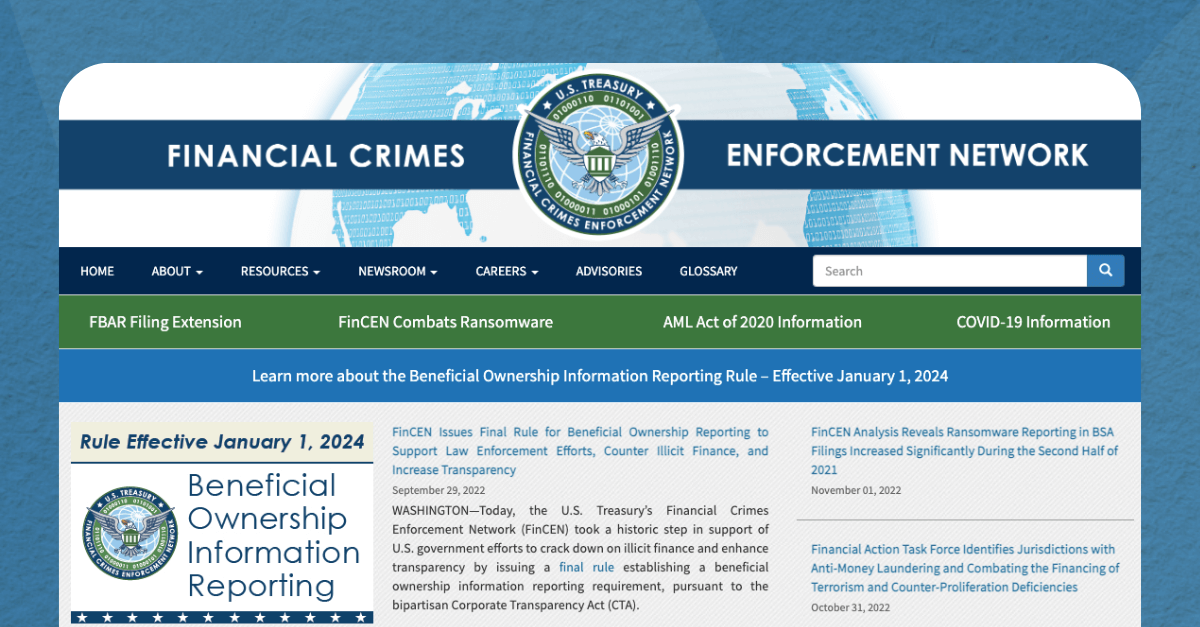Understanding the Corporate Transparency Act
Posted by Josh Twilley
November 1, 2022
On September 29, 2022, the Financial Crimes Enforcement Network (FinCEN) announced its final guidelines for the reporting requirements related to the Corporate Transparency Act. Here’s a quick breakdown of the act, the reporting requirements, who has to file, what must be reported and more.
What is the Corporate Transparency Act?
The Corporate Transparency Act was signed into law in 2021 in an effort to help law enforcement identify corporate shells and curtail their use amongst beneficial owners of corporate entities. At a high level, the law requires “most corporations, limited liability companies, and other entities created in or registered to do business in the United States” to file a statement of beneficial ownership with FinCEN, “identifying the persons who ultimately own or control the company.” (fincen.gov)
These filing requirements are expected to go into effect on January 1, 2024.
Who Must File?
The Corporate Transparency Act states that most businesses formed in the United States or those formed in a foreign country that do business in the U.S. are considered Reporting Companies. There are 23 exemptions to this definition, generally for entities that are either already regulated by other Federal agencies, such as banks or utilities or are considered “large” organizations with an office in the United States, 20 or more U.S-based employees and more than $5 million in gross receipts.

What Information Must Entities Report?
Within 30 days of a corporate formation, Reporting Companies must report information on the Beneficial Owners and the Applicant(s).
- Beneficial Owners are individuals who either 1) exercise substantial control over a Reporting Company or 2) own or control at least 25 percent of the ownership interest of a Reporting Company. It is notable that “substantial control” is defined broadly while the definition of “ownership” offers some exclusions (such as for minors and intermediaries).
- The filing rules permit up to two Applicants to be included in the filing. An Applicant is 1) the individual who directs or controls the filing, and 2) the individual who directly files the document. Both must be reported. If these are the same person, then only one Applicant filing is required.
What Specific Information Must be Reported?
Beneficial Owners and Applicants are to report the same information (a Beneficial Ownership Information Filing, or BOI Filing) that includes full name, date of birth, current residential address (Beneficial Owner) or business address (Applicant), and a unique identifying number from an acceptable identification document, such as a driver’s license or passport, as well as an image of that document.
To facilitate this reporting, FinCEN will also provide a unique identifier (FinCEN ID) to individuals who provide reporting information, to be used for future filings. This allows Applicants (attorneys, service companies) to file the identification documents once and provide the FinCEN ID for all future filings.
What About Entities Formed Prior to January 1, 2024?
Entities formed prior to January 1, 2024 and are not exempted have one year to complete their BOI Filing. Note that only Beneficial Ownership information is required. Applicant information is not required.
Are There Any Ongoing Requirements?
Yes, but only in the case of a change in Beneficial Owner information. There is no annual filing requirement, so it is important that the Reporting Company remembers to update its BOI Filing should any of the information change.
What Are the Penalties for Noncompliance?
Failure to comply with the new regulations can be severe, with civil penalties of up to $500 for each day of noncompliance and imprisonment of up to two years. The harshest penalties are reserved for willful noncompliance. It is also worth noting that the Reporting Company is responsible for filing and maintaining the information.
Further Reading
FinCEN has a helpful fact sheet on the new reporting requirements and the final rules are posted at federalregister.gov.
And as always, we’re here to answer any questions you might have about the Corporate Transparency Act.